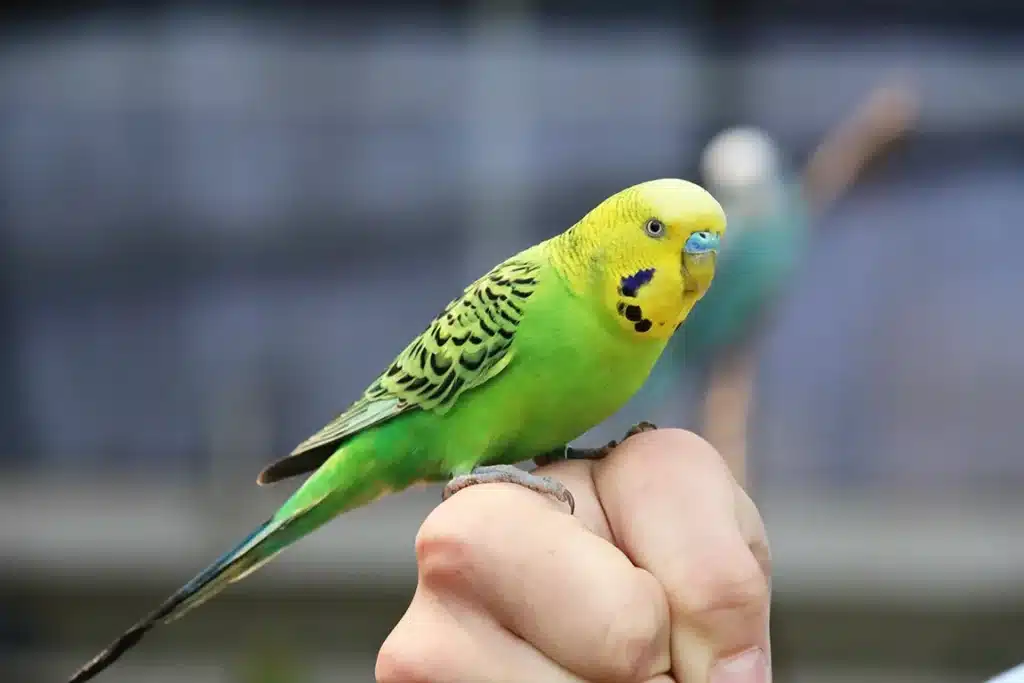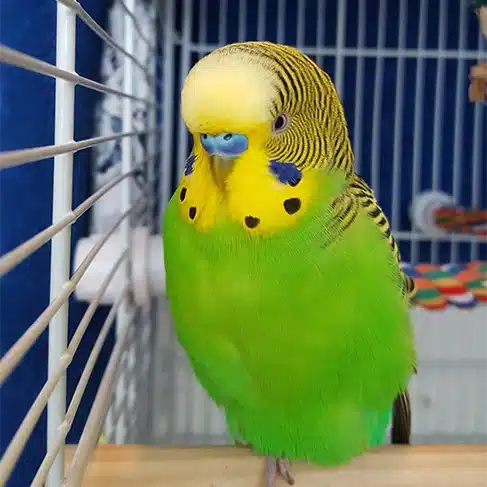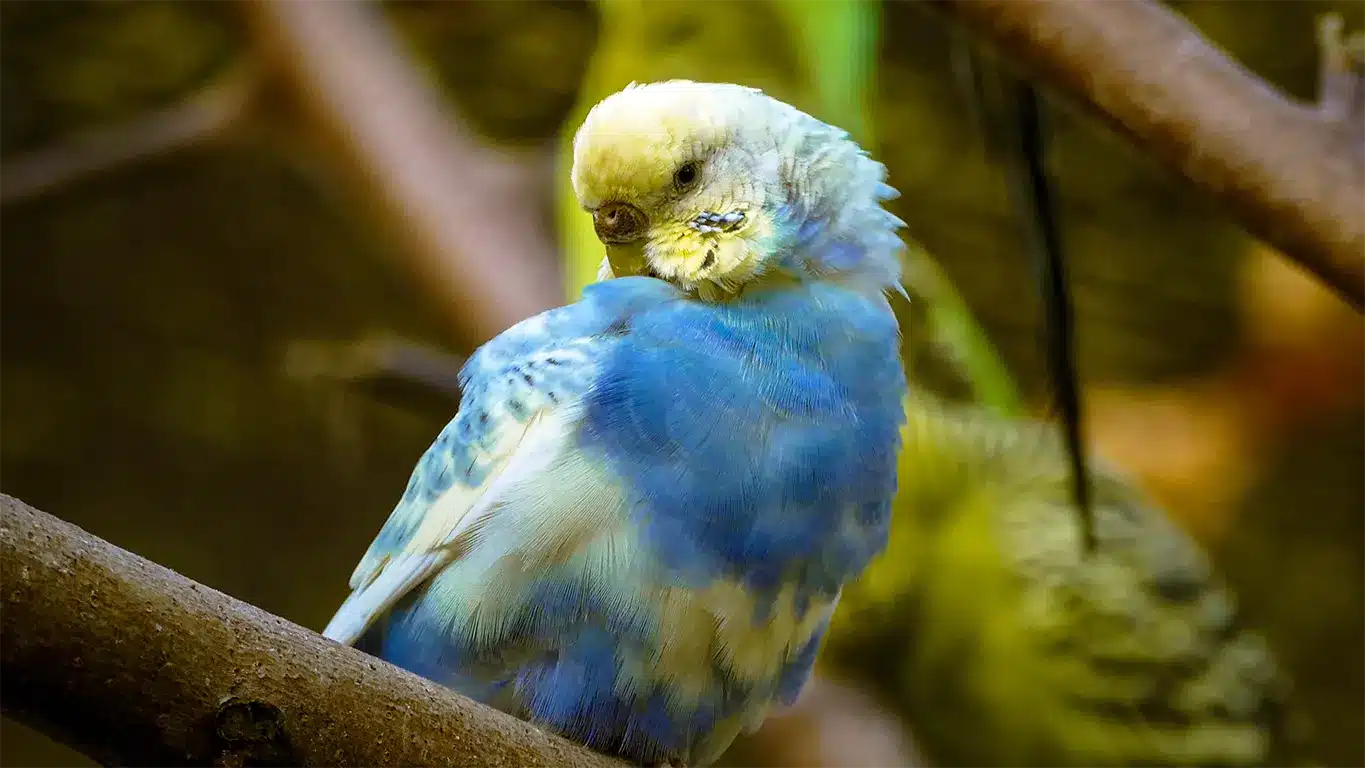Budgies are often active and happy little birds. But, it can sometimes show unusual behaviour, like being quiet, not moving, biting, or hissing. This is the way your budgie is telling you that it is stressed.
However, there are other signs that also indicate the behaviour of a stressed budgie.
In this article, you will learn about the most common signs that a budgie is stressed. Besides, you will know why it happens and how to care for a stressed budgie.
How To Tell If A Budgie Is Stressed?
It is often challenging to tell if your budgie is stressed or needs veterinary assistance for health issues. The symptoms can confuse any budgie owner as they are mostly similar for an ill budgie and a stressed budgie.
So, pay attention to these six most noticeable signs and consult a vet for reassurance and treatment for your feathered friend.
1. Picking Feathers
In stress or boredom, larger birds mostly pick their feathers. However, smaller birds like budgerigars can also develop this attitude. The feather picking activity has its level.
Sometimes, a little bit of feather picking is not harmful; your bird is doing it to keep itself busy or stimulated. And often, it gently does it as a part of preening or grooming itself. Yet, if it continues to pick its feathers aggressively, it means something is wrong.
Some birds can even go beyond this activity and do self-mutilation. If your budgie is under too much stress, it can pick up its feathers and chew its skin, continuing to dig in its muscles and bones.
2. Aggression
Unusual behaviours like biting, hissing, and screaming are common ways birds show aggression. If your baby bird is doing more than nibbling on your hand, it may be stressed or not liking your presence.
To show aggression, it may flap its wings too much or stand still in a guard position. It may also scream seeing you or other people around and hiss if someone gets near it.
3. Less Or Unusual Vocalization
Budgies are very friendly birds. They are tiny, love to chirp and fly, and always carry happiness within. You can feel your budgie’s happy mood listening to its chirping sound, right?
Similarly, you can get the vibe and tell when your budgie’s chirping is unusual. A different vocalization may indicate your budgie is stressed or depressed and requires attention.
Besides, your happy chirping budgie can even decrease or stop vocalization in stress. In such unusual activity, check on your bird closely.
4. Stress Lines
Stress lines or stress bars are lined marks that appear on the downside of feathers. If your budgie is stressed, you will notice a blurry or sometimes visible line on the lower side of your bird’s feathers.
5. Refusing To Eat
Your budgie may lose its appetite due to stress or depression. No matter how much of a delicious meal you give, it may refuse to eat. It might even avoid its favorite treats in distress as well.
6. Destructive Behaviour
Your bird may chew or try to destroy its feeding bowl, water bowl, or cage or even hurt itself under stress. You may also notice behaviours like screaming or hissing if anyone approaches its cage.
What Causes Stress In Budgies?

Budgies are very routined and love to be maintained. Even a small change in their routine can cause them stress or other mental issues. Prolonged stress can also create physical health issues.
Change In Routine
As birds love to follow a schedule, they always expect to be the same. They want you to feed them at the same time every day. Even they maintain their play and sleep routines.
However, it is not always possible for a bird owner to maintain the schedule. Suppose you are on a day trip, and your budgie’s routine gets interrupted for that specific day. This small situation is enough to upset your budgie.
Interaction With New Animals
Be careful if you are considering getting a different animal alongside a budgie to keep as a house pet. It is true that other animals, like dogs or cats, can be good companions to your budgie.
But, if your budgie is not tamed yet, if it’s a single budgie or if it still hasn’t gained much trust in you, the appearance of a new animal might frighten them. And it may go under stress, and it might become impossible then to tame or regain your budgie’s trust.
Lack Of Care And Attention
You already know that budgies are very social birds. They are friendly creatures who love to spend time with their owners. Even though you give your birdie its food and water on time with occasional treats, it will still seek your extra attention.
This means it wants you to play and spend quality time with it at some point daily. So, if you can’t find enough time to give to your budgie, even with a proper lifestyle, your budgie can get depressed and sad.
Health Issues
Sometimes, there is no other external cause, but your budgie’s sick health is causing it stress. You know very well that if your body is unwell, your mind won’t feel good either.
The same thing can happen to your budgie, which needs to be checked by a vet.
Environmental Changes
Sudden environmental changes such as shifting to a new home, painting your house with a new color unfamiliar to the budgie, and loud noises around the house can irritate your budgie’s mood.
These changes can trigger stress in your budgie.
Light Cycle Changes
Light cycle changes mean small changes, like relocating the cage to a new house room and changing the lighting availability. These can also cause stress to your budgie to some extent.
How To Calm A Stressed Budgie?

You can take measures to calm a stressed budgie if it is suddenly stressed out. Besides, you can also follow some facts strictly to avoid the chances of your budgie getting stressed.
Maintain A Consistent Routine
When you bring your pet budgie from the pet bird shop, get the details of its existing routine, diet, and play times from the shopkeeper. Try to follow the same or make a new healthy routine and stick to it.
Avoid Sudden Changes
Do not suddenly change your budgie’s diet, sleep schedule, or playtime. Maintain the exact time you feed the bird, and set it free out of the cage to fly around and play with it.
Treat Health Issues Consulting With A Vet
If you notice your budgie is unwell, consult a vet immediately. Do not delay and prevent stress in your bird.
Give It Enough Time And Attention
No matter how busy you are, select a specific time in the day to play with your budgie. If you don’t know how to interact with it, at least sit in front of your bird to make it feel you are there for it.
Tame Your Budgie Properly
Taming the budgie will make it feel confident around you. A successful taming can create a bond between you and your buddy, ensuring better communication.
Without taming, your budgie will always feel unsafe and threatened, leading to stress and other health issues.
Is My Budgie Stressed Or Sick?
It’s a bit tough for bird owners to spot illness in their pets, as they often hide the signs of being sick. And it’s even trickier to tell if a bird is stressed or unhappy. Howbeit, there are some common signs to know whether your budgie is stressed or sick.
Stress Signs
- A stressed budgie may exhibit behaviors like feather plucking, excessive screeching, or avoiding interaction as signs of stress.
- Sudden changes in the environment like bringing another pet, loud noises, or moving the cage can stress them out.
Sickness Signs
- If your budgie is suffering from illness, you may notice signs such as lethargy, loss of appetite, a fluffed-up posture, or difficulty breathing.
- Changes in droppings, like diarrhea or unusual coloration can also signal sickness in birds.
What Is An Abnormal Behavior In Budgies?
Abnormal behavior in budgies includes puffing up feathers, aggression, loss of appetite, or increased sleeping or eyes closed. These signs could hint at health issues that need attention.
Normally you can see that, a happy budgie is lively, playful, and loves to interact with its surroundings. But if a budgie seems lethargic or not interested in playtime, it’s worth looking into.
Also, pay attention to any feather plucking, self-grooming, and excessive screaming as these could indicate stress in budgies.
Why Is My Budgie Scared Of Me?
If you have recently brought your budgie home, it’s probably nervous about its new environment, including you. In that case, you have to be patient and give them time to settle in. Sudden movements or loud noises can also scare them because they’re naturally cautious and alert birds.
If your budgies seem distrustful of you, then they’ll probably be scared. So building trust is very important here. Talk with your bird softly and avoid forcing interaction because it creates chaos.
Lastly, if you’ve been rough with your budgie or made it feel scary before, it might think of you as someone threatening. This could also be a reason why your budgie is scared of you.
Conclusion
I hope you have a clearer idea about stressed budgie behaviour as you are still reading. Look for the signs mentioned above to identify if your budgie is stressed.
Also, make sure you take professional advice from an aviary specialist veterinarian besides following this guide to get the best results.

I’m Shajid Rahman, a happy owner of 6 beautiful budgies. I take care of this website to share tips, fun facts, and care guides about these birds.
Whether you’re a budgie lover or considering one as a pet, you’ll find helpful info here! I love these cute creatures, so I made this blog for Budgerigar fans. You can expect to get reliable information based on my years of experience. More About Me →

